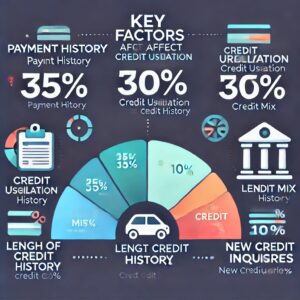Introduction
A credit score score is extra than just various; it’s a mirrored image of your financial fitness and creditworthiness. Whether or not you’re applying for a mortgage, an automobile mortgage, or a credit score card, creditors use your credit score score to evaluate your risk degree. The better your credit score score, the better financial possibilities you may get admission to. However what exactly makes up a credit rating, and how can you attain the coveted 800+ mark? On this guide, we’ll smash down the entirety you need to recognize about credit scores, the key elements influencing them, and actionable steps to gain an extraordinary rating.
Expertise credit rating rankings
A credit score rating is a three-digit range that represents your creditworthiness. It generally ranges from three hundred to 850, with better scores indicating higher credit score fitness. The maximum generally used credit score scoring models are fico score and vantagescore.
Credit score tiers
Three hundred – 579: poor
580 – 669: fair
670 – 739: good
740 – 799: very good
800 – 850: terrific
A excessive credit rating can open doors to lower interest fees, higher credit limits, and better monetary possibilities.


Key factors that impact your score
Your credit rating is determined by means of numerous elements, each carrying a exclusive weight:
1. Charge history (35%)
Your history of making on-time bills is the maximum extensive issue. Overdue bills, defaults, or collections can severely effect your rating.
2. Credit usage (30%)
This refers to the proportion of your to be had credit score that you’re the usage of. Preferably, keep your credit score utilization beneath 30%, but for an 800+ rating, intention for 10% or much less.
3. Length of your score history (15%)
The longer your credit records, the better. Lenders select debtors with established credit habits over several years.
4. Credit score blend (10%)
A various mix of credit sorts—which include credit cards, installment loans, and mortgages—can boost your score.
5. New credit score inquiries (10%)
Applying for too many new credit debts in a short time can negatively effect your rating. Tough inquiries stay in your document for up to 2 years.

Actionable Steps to Reach an 800+ Credit Score
Attaining a perfect credit score score isn’t impossible, but it calls for subject and clever monetary conduct. Here’s how:
1. Pay Your Bills on Time, Every Time
Late payments can significantly hurt your credit score. To avoid this, consider setting up automated payments or reminders to stay on top of your due dates.
2. Preserve credit score utilization beneath 10%
If you have a total credit limit of $10,000, try to keep your balance below $1,000 at any given time.
3. Don’t Close Old Credit Accounts
Closing antique credit playing cards shortens your credit score history, that can lower your rating. Hold older debts open, even if you don’t use them often.
4. Restrict tough credit inquiries
Applying for multiple credit cards or loans in a short period can raise red flags. Space out your credit applications strategically.
5. Dispute mistakes in your credit record
Check your credit reports from Experian, Equifax, and TransUnion regularly. If you find any errors, dispute them immediately to avoid negative impacts on your credit score.
Common Mistakes to Avoid
Many humans unknowingly harm their credit score rating through making avoidable errors. Right here are a number of the most not unusual pitfalls:
1. Maxing Out Credit Cards
High credit utilization can hurt your score. Even in case you pay the stability in full, maxing out your card can nonetheless negatively effect your credit score.
2. Paying Less Than the Minimum Due
If you can’t pay in full, at least make the minimum payment to avoid late fees and negative marks on your credit report.
3. Applying for Too Many Credit Cards at Once
Each hard inquiry can slightly lower your score. Applying for multiple cards in a short period can be a red flag to lenders.
4. Ignoring Your Credit Report
Errors, fraudulent activity, or outdated information can lower your score. Always check your credit report for inaccuracies.
How Long Does It Take to Achieve an 800+ Credit Score?
The timeline for achieving an 800+ credits scrore depends on your current financial situation. Here’s an estimate based on different starting points:
Poor Credit (300-579): 5-7 years
Fair Credit (580-669): 3-5 years
Good Credit (670-739): 1-3 years
Very Good Credit (740-799): 6-12 months
Building credit is a gradual process, but with consistency, an 800+ credits scrore is achievable.

Benefits of Having an 800+ Credit Score
Reaching an 800+ credits scrore comes with numerous financial perks:
1. Lower Interest Rates on Loans and Credit Cards
Lenders offer the best interest rates to those with excellent credit scores, saving you thousands over time.
2. Higher Credit Limits
With a high score, banks are more likely to approve you for higher credit limits, giving you better financial flexibility.
3. Easier Loan Approvals
Whether it’s a mortgage, auto loan, or personal loan, an 800+ score makes the approval process much smoother.
4. Higher coverage charges
Many insurance corporations use credit score scores to determine premiums. A excessive rating can result in lower insurance prices.
5. Better Rental Opportunities
Landlords check credit scores before approving rental applications. A high score makes you a more attractive tenant.
Final Thoughts
Your credits scrore plays a crucial role in your financial well-being. While reaching an 800+ credit score takes time and effort, following smart financial habits can make it achievable. By paying bills on time, keeping credit utilization low, maintaining old accounts, and avoiding common mistakes, you can build and maintain a strong credit profile.
Start implementing these strategies today, and you’ll be well on your way to financial success with a perfect credits scrore!







